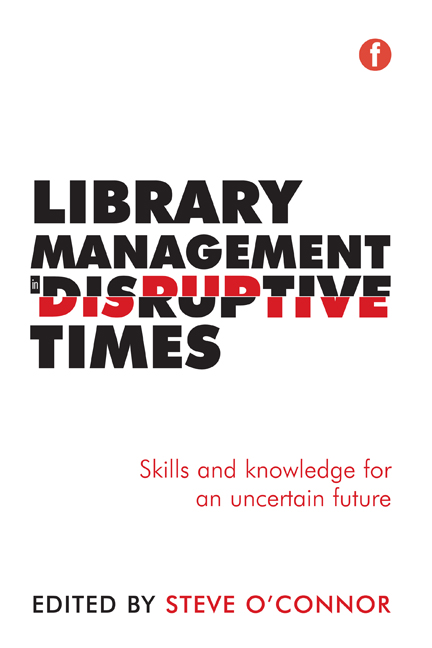Book contents
- Frontmatter
- Contents
- Contributors
- Introduction
- 1 Leading change: knowledge for success
- 2 Management fads and fashions and their impact on the LIS community
- 3 The Five Rules of Engagement for librarians: aux Ranganathan's laws of library science
- 4 Library management, disruption and consortia: an Australian example
- 5 No regrets; just lessons: economic crisis is changing our life and the management of libraries
- 6 Introducing agile principles and management to a library organization
- 7 The role of professional associations in changing times
- 8 And the walls came tumbling down ... The library profession confronts all-invasive new managerialism
- 9 What is behind the meaning of disruption? Or, thinking of management strategies from the outside
- Index
9 - What is behind the meaning of disruption? Or, thinking of management strategies from the outside
Published online by Cambridge University Press: 08 June 2018
- Frontmatter
- Contents
- Contributors
- Introduction
- 1 Leading change: knowledge for success
- 2 Management fads and fashions and their impact on the LIS community
- 3 The Five Rules of Engagement for librarians: aux Ranganathan's laws of library science
- 4 Library management, disruption and consortia: an Australian example
- 5 No regrets; just lessons: economic crisis is changing our life and the management of libraries
- 6 Introducing agile principles and management to a library organization
- 7 The role of professional associations in changing times
- 8 And the walls came tumbling down ... The library profession confronts all-invasive new managerialism
- 9 What is behind the meaning of disruption? Or, thinking of management strategies from the outside
- Index
Summary
It is important to write about the management of libraries. The literature is extensive and often reflective of the era when it was written, radiating much wisdom, individual perspective, theory, research and experience. It is also grounded in and informed by many social, informational and technological currents. Embedded within it are the best management theories, strategies and pathways, with the aim to achieve excellence in current and future planning and in the application of change. Indeed, change management has almost become a discipline in its own right and will most likely remain so for the foreseeable future, as successful change requires the most careful planning and management. The aim of this chapter is to reflect on changes that have happened in and to libraries, to understand the extent to which they have been ‘disruptive’ and to advocate for the literature on change to be more forward looking and less prescriptive.
The chapters in this volume were commissioned to explore most aspects of what is meant by ‘library management’, but in disruptive times. The term ‘disruptive’ is used in the context in which Clayton Christenson popularized it: ‘describes a process by which a product or service takes root initially in simple applications at the bottom of a market and then relentlessly moves up-market, eventually displacing established competitors’.1 This will be explored in more detail later in this chapter.
The central thesis of this chapter is that libraries are very vulnerable to fundamental ‘disruptive change’, but that such change is currently not being recognized as anything other than simple change. If this thesis is sound, then library managers need to look to planning for the future of libraries in a significantly different way. Many libraries are working hard on change, but their plans are often limited to the next annual budget cycle. They need to look beyond the limits of this annual cycle and plan for a radically different future. It is the present author's contention that this future can be achieved within a planning cycle of no more than three to five years. Most library planning does not allow for a future that is even marginally, let alone radically, different from what exists now. This in itself is a problem and an area of great vulnerability for libraries.
- Type
- Chapter
- Information
- Library Management in Disruptive TimesSkills and knowledge for an uncertain future, pp. 141 - 154Publisher: FacetPrint publication year: 2015



